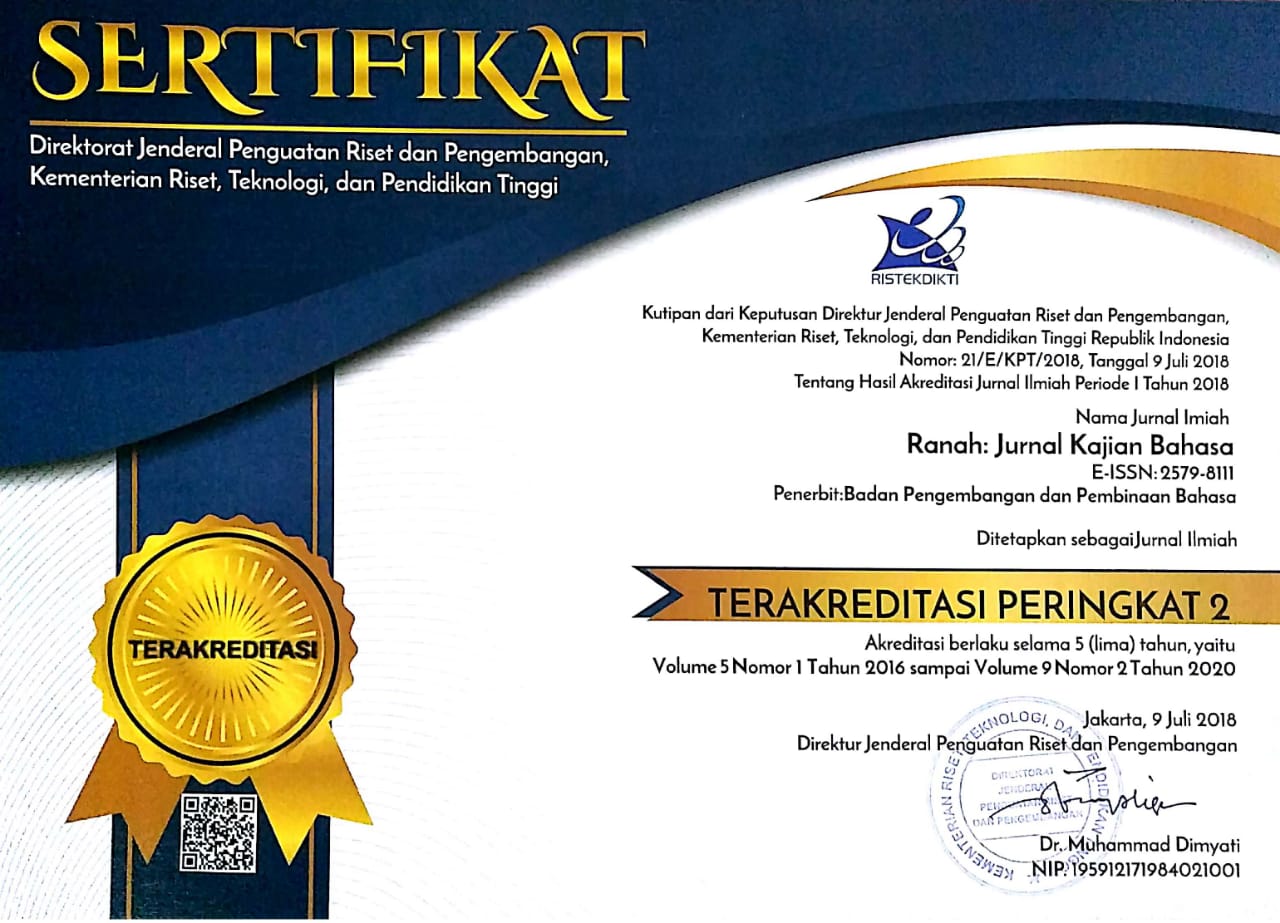Transmisi Memori dan Wacana Rekonsiliasi dalam Cerpen “Perempuan Sinting Di Dapur” Karya Ugoran Prasad: Kajian Postmemory
Abstract
This study aims to explain the structure of memory transmission in the short story "Perempuan Sinting di Dapur" by Ugoran Prasad and the reconciliation discourse offered by the author. Overall, this short story raised the 1965 Event in Indonesia. Ugoran Prasad tried to discuss the impact caused by the incident, both in terms of the perpetrators and victims. The theory used is the postmemory theory developed by Marianne Hirsch. The results of this study indicate that the structure of memory transmission in short stories is mediated by behavior and narratives, both from the perspective of victims and perpetrators. Both of these parties turned out to be equally save the deep trauma that was carried throughout his life. Then, through this short story, Ugoran Prasad presented a discourse of reconciliation to those who had a traumatic impact on the 1965 event, both generations who were traumatized and post-generation.
Abstrak
Penelitian ini bertujuan untuk menjelaskan struktur transmisi memori dalam cerpen “Perempuan Sinting di Dapur” karya Ugoran Prasad dan wacana rekonsiliasi yang ditawarkan oleh penulis. Secara keseluruhan, cerpen ini mengangkat Peristiwa 1965 di Indonesia. Ugoran Prasad berusaha membahas mengenai dampak yang ditimbulkan dari peristiwa itu, baik dari segi pelaku maupun korban. Adapun teori yang digunakan adalah teori postmemory yang dikembangkan oleh Marianne Hirsch. Hasil dari penelitian ini menunjukkan bahwa struktur transmisi memori dalam cerpen dimediasi oleh perilaku dan narasi atau cerita, baik dari perspektif korban maupun pelaku. Kedua pihak ini ternyata sama-sama menyimpan trauma mendalam yang dibawa seumur hidupnya. Kemudian, melalui cerpen ini Ugoran Prasad menghadirkan wacana rekonsiliasi kepada pihak-pihak yang berdampak trauma akan Peristiwa 1965, baik generasi yang mengalami trauma maupun post-generation
Keywords
Full Text:
PDF (Bahasa Indonesia)References
American Psychiatric Association. (2006). Practice Guidelines for the Treatment of Psychiatric Disorders. Arlington: American Psychiatric Association. https://doi.org/10.1176/appi.books.9780890423363
Anderson, B. (2006). Becoming and being hopeful: Towards a theory of affect. Environment and Planning D: Society and Space, 24, 733-752. https://doi.org/10.1068/d393t
Assa, A. E. P. (2019). Postmemory dalam Novel Tapol Karya Ngarto Februana. Jurnal Poetika: Jurnal Ilmu Sastra, 7(1), 17-31.
Faruk. (2012). Metode Penelitian Sastra: Sebuah Penjelajahan Awal. Yogyakarta: Pustaka Pelajar.
Hirsch, M. (1992). Family Pictures: Maus, Mourning, and Post-Memory. Discourse, 15(2, Special Issue: The Emotions, Gender, and the Politics of Subjectivity (Winter 1992-93)), 3-29.
Hirsch, M. (2012). The Generation of Postmemory: Writing and Visual Culture After Holocaust. New York: Colombia University Press.
Ibrahim, R. (2017). Trauma Irama Ugoran Prasad. Diambil 27 Desember 2018, dari Jurnal Ruang website: https://jurnalruang.com/read/1508942178-trauma-irama-ugoran-prasad
Jati, G. P. (2020). Transmisi Memory Queer dan Wacana Counter Memory dalam Novel Tiba Sebelum Berangkat Karya Faisal Oddang: Kajian Postmemory. Universitas Gadjah Mada.
Jones, P. I., & Osborne, T. (2020). Analysing virtual landscapes using postmemory. Social & Cultural Geography, 21(2), 186-206. https://doi.org/10.1080/14649365.2018.1474378
Mohamed, S. (2015). Of Monsters and Men: Perpetrator Trauma and Mass Atrocity. Columbia Law Review, 115, 157-216.
Morag, R. (2013). Perpetrator Trauma and Current Israeli Documentary Cinema. Camera Obscura, 27(2/80), 93-133. https://doi.org/10.1215/02705346-1597222
Prasad, U. (2009). Perempuan Sinting di Dapur. In Smokol: Cerpen KOMPAS Pilihan 2008. Jakarta: Penerbit Buku Kompas.
Putra, J. N. I. (2018). Konstruksi Bima Dan Ekalaya Dalam Novel Pulang Karya Leila S. Chudori Kajian Postmemory. Universitas Gadjah Mada.
Saputro, G. (2013). Jakarta 2039: Membangun Monumen Ingatan Tragedi Kekerasan. Jurnal Jentera, 2(1), 21-33. https://doi.org/10.26499/jentera.v2i1.389
Schaap, A. (2005). Political Reconciliation. London and New York: Routledge. https://doi.org/10.4324/9780203002773
Tim Tempo. (2012). Tentara, Santri, dan Tragedi Kediri. Liputan Khusus Tempo: Pengakuan Algojo 1965.
DOI: https://doi.org/10.26499/jentera.v9i1.2265
Refbacks
- There are currently no refbacks.






















